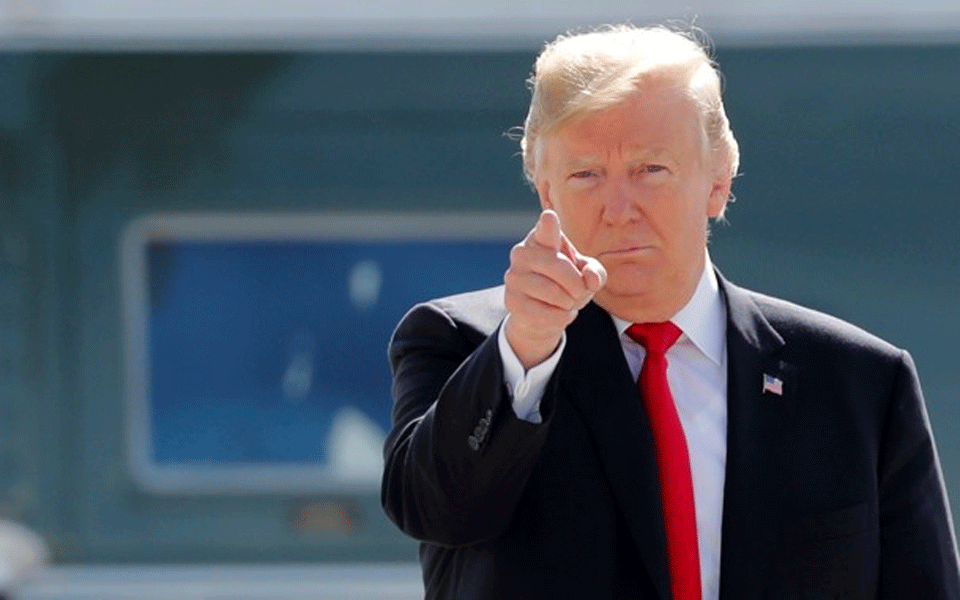Washington: US President Donald Trump Wednesday imposed tougher-than-ever sanctions on Iran's iron, steel, aluminum and copper sectors, a move aimed at stopping Tehran from acquiring a nuclear weapon and intercontinental ballistic missiles and to counter its "malign influence" in the Middle East.
A year after he withdrew from the "fatally flawed", "one-sided" Iran nuclear deal and began the process of reimposing sanctions on Tehran, Trump with his new move has now imposed sanctions on Iran's top three exports oil, petrochemicals and metals.
The Trump administration is imposing tougher sanctions on Iran than ever before because the regime continues to engage in destructive and destabilising activities, the White House said moments after Trump notified the US Congress about his latest sanctions on Iran.
"The (Iranian) regime has maintained its nuclear ambitions and continues to develop its ballistic missile capabilities and support terrorism," the White House said.
"The United States will aggressively enforce its sanctions, and those who continue to engage in sanctionable activity involving Iran will face severe consequences," it said.
An executive order signed by Iran takes steps to deny Iran revenue, including revenue derived from the export of products from Iran's iron, steel, aluminum, and copper sectors that may be used to provide funding and support for the proliferation of weapons of mass destruction, terrorist groups and networks, campaigns of regional aggression, and military expansion, Trump said.
"It remains the policy of the United States to deny Iran all paths to both a nuclear weapon and intercontinental ballistic missiles, and to counter the totality of Iran's malign influence in the Middle East," Trump said in his executive order.
"It is also the policy of the United States to deny the Iranian government revenue, including revenue derived from the export of products from Iran's iron, steel, aluminum, and copper sectors, that may be used to provide funding and support for the proliferation of weapons of mass destruction, terrorist groups and networks, campaigns of regional aggression, and military expansion," it said.
Noting that the Iran deal was a disastrous "one-sided" deal that failed to end Iran's nuclear programme and the full range of the regime's malign activity, the White House said Trump withdrew from the deal because it failed to protect American national security interests and enabled Tehran's malign behaviour.
"The Iran deal left Iran with future pathways to pursue nuclear weapons. The regime was allowed to preserve its nuclear infrastructure, keep enriching uranium, and continue research and development. The deal included incomplete mechanisms for inspections and verification," it said.
The extensive nuclear archive exposed by Israel proves Tehran pursued nuclear weapons and secretly preserved its blueprints and database to do so, the White House said.
The deal failed to address Iran's wide range of malign activities, including its global terrorist campaign, unjust detention of Americans, ballistic missile development and more, it alleged.
The regime received an influx of cash because of sanctions relief that it has used to engage in and support terrorism and to destabilise the Middle East, it said.
The White House asserted that President Trump's maximum pressure campaign is working, having already denied the regime direct access to more than USD 10 billion in oil revenue since May 2018.
The Trump administration will continue to apply maximum pressure on the Iranian regime until its leaders change their destructive behaviour and return to the negotiating table, it said.
The sanctions come after Trump last month refused to give waivers to countries like India from buying oil from Iran, in an attempt to reduce Iran's oil exports to zero.
After coming to power, Trump withdrew from the Iranian nuclear deal last year and has imposed stringent sanctions against what he describes as the "authoritarian" Iranian regime.
The US is seeking to ramp up pressure on Iran to counter what the White House perceives to be a potential threat.
Last month, the US designated Iran's Revolutionary Guard a foreign terrorist organisation, the first time the designation has been applied to a government entity.
Let the Truth be known. If you read VB and like VB, please be a VB Supporter and Help us deliver the Truth to one and all.
Dubai: Smoke was seen rising from an area near the United States Consulate in Dubai, according to witness accounts cited by Reuters.
There was no immediate official confirmation on the extent of damage or whether there were any casualties in the incident.
Earlier, the US embassy in Riyadh, Saudi Arabia’s capital, was also attacked. Authorities reported damage to the premises, but no casualties were recorded.
The developments come amid heightened tensions in the region, with Iran continuing to target US interests in the Middle East following deadly attacks launched on Saturday by Israel and the United States.
Near US embassy in Dubai pic.twitter.com/z5VTZNVxNO
— Sahil Shah (@thesahilsshah) March 3, 2026





